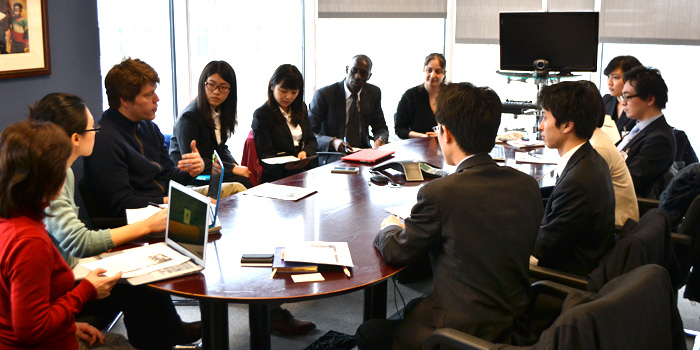Internship at Ministry of Education in Timor-Leste (Takao OKAMOTO)
I had the opportunity to conduct my internship in the Ministry of Education (MoE) in Timor-Leste from August of 24th to September of 28th 2015. I was initially attached to...
Graduate School of International Cooperation Studies (GSICS), Kobe University


I participated in the overseas training in Toronto and Washington, D.C. for two weeks from March 9 to 22, 2014. The overall purpose for attending the training is to further my dissertation research project through various types of activities: attending an international conference and conducting interview with front-line experts.
During the first half of the training, I attended the 58th Annual Conference of the Comparative & International Education Society, which was held at the Sheraton Centre Toronto Hotel, Toronto, Canada from March 10 to 15. In the conference, I took part in the New Scholars Dissertation Mentoring Workshop. I was assigned to the group named “Economics of Education,” and presented my proposal titled “Examining the Determinants in School Enrollment of Children from Rural Households under Universal Primary Education Policy in Uganda.” Throughout the workshop, I could receive many useful comments, which help me to sharpen my research proposal, from two professors and three doctoral students.
I also presented my paper titled “A Counterfactual Decomposition Analysis of Regional Differences in Learning Achievement: The Case of Primary Education in Uganda” in the session on “Schooling and the Community.” Besides, I attended several sessions to learn about cutting-edge researches and build network among top-class researchers and practitioners with similar interests. Since the theme of the conference was “Revisioning Education for All,” there were lots of sessions related to my research topic. It was also honor to join the dinner organized by the Institute for International Studies in Education (IISE), University of Pittsburgh, where I served as a visiting student scholar last fall semester. I could reconnect with many colleagues, alumni, and friends in IISE.
During the second half of the training, I visited the World Bank Headquarters in Washington, D.C., USA. to conduct interview with the leading experts getting involved in the education development project in Uganda. First, I joined the meeting with Mr. Andreas Blom, Leading Education Economist, Task Team Leader of Uganda, to learn about the current situation of the Global Partnership for Education Teacher and School Effectiveness Project in Uganda. In the same meeting, I could also hear the preliminary findings from the impact evaluation of some innovative interventions under Universal Secondary Education policy in Uganda.
Second, I conducted interview with one of the Economists in the Living Standards Measurement Study-Integrated Surveys on Agriculture team, who is in charge of Uganda National Panel Survey (UNPS). Since I am doing my analysis using UNPS data, it was helpful to gain lots of useful information on how the current situation of data collection is and what kinds of analyses have already been done and are ongoing.
Moreover, I learned a lot about cutting-edge research and project in the field of international education development, conducting interview with leading researchers and practitioners based in Washington, D.C. For instance, I joined the meeting with Dr. James H. Williams, Associate Professor in the George Washington University. I also joined the meeting with Dr. Harry Anthony Patrinos, Manager at the World Bank’s education sector and Dr. Halsey Rogers, Lead Economist with the Education team in the Human Development Network. It was also honor to reconnect with former visiting professors of Kobe University, including Dr. Mark Ginsburgh, Dr. Eduardo Vélez Bustillo and Dr. Robert Prouty, and FHI 360 staffs with whom I worked during my internship last summer.
In conclusion, Overseas Training was very rewarding and productive. By presenting papers in the international conference, I could execute my dissertation by receiving useful comments. Besides, by conducting interview with leading experts in Washington, D.C., I could gain deep insights and precious information which are helpful to sophisticate my study. Furthermore, I could create and maintain a precious network in North America and develop a solid foundation for my future research and career.
My deepest gratitude goes to my academic advisor, Professor Keiichi Ogawa, for providing me with this precious opportunity. I would also like to express my sincere appreciation to Dr. Shinsaku Nomura, Dr. Mari Shojo, Dr. Nobuyuki Tanaka and Ms. Miho Nomura for offering warm supports for us.
Katsuki SAKAUE
Doctoral Student